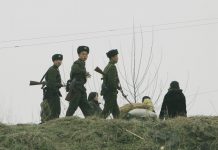Though it may seem as if the Kim Jong Eun regime is growing
more stable as the general North Korean economic situation improves, key experts maintain that the external appearance of the regime hides risky
socio-political tensions.
Adherents of this view posit that Kim Jong Eun has shown
consistently poor leadership in not only the economic sector but also in the political
arena, for instance by embarking upon the purge of Jang Sung Taek. They believe
that while South Korea should not assume unification is impending, it is
essential for Seoul to adopt a policy capable of responding to unpredictable
systemic changes brought on by the rash unpredictability of North Korean policy-making.
Speaking at a seminar hosted by Radio Free Chosun at Seoul
Press Center on the 27th, NKnet researcher Kim Young Hwan explained
why he is in this camp. “We are at a point where we must begin preparing in
earnest for North Korean regime collapse and unification,” he declared boldly. “Though
it is not possible to say with any certainty that ‘the North Korean regime will
collapse in the next few years’ or something like that, it is possible to say that they are moving
gradually into more dangerous waters.
“If the present level of [Kim Jong Eun’s] leadership
persists, not only will it prove difficult for him to guide the current North
Korean system well; as North Korea becomes many times more complicated as
economic changes progress, he won’t be able to lead it at all.”
“It is not impossible for economic openness and a hereditary
dictatorship to coexist,” Kim acknowledged, suggesting that all in North Korea
is far from lost. “However, that coexistence must be meticulously arranged, and there must be well-balanced leadership borne of strength and dictatorial strategy. We have not been
able to verify this element where Kim Jong Eun is concerned.”
Citing Masikryong Ski Resort as one of Kim’s multitude of
errors to date, he asserted, “Masikryong was not only an extraordinarily poor
investment in terms of the efficient allocation of state resources; to mature
cadres it will also have come across as a really childish policy decision. The same is true of the purge of Jang Song Taek: the
harshness and cruelty with which the young leader purged someone who had been a
long-time personal advisor to his own father, and was his uncle, will have aroused
emotional hostility in Party cadres.”

















